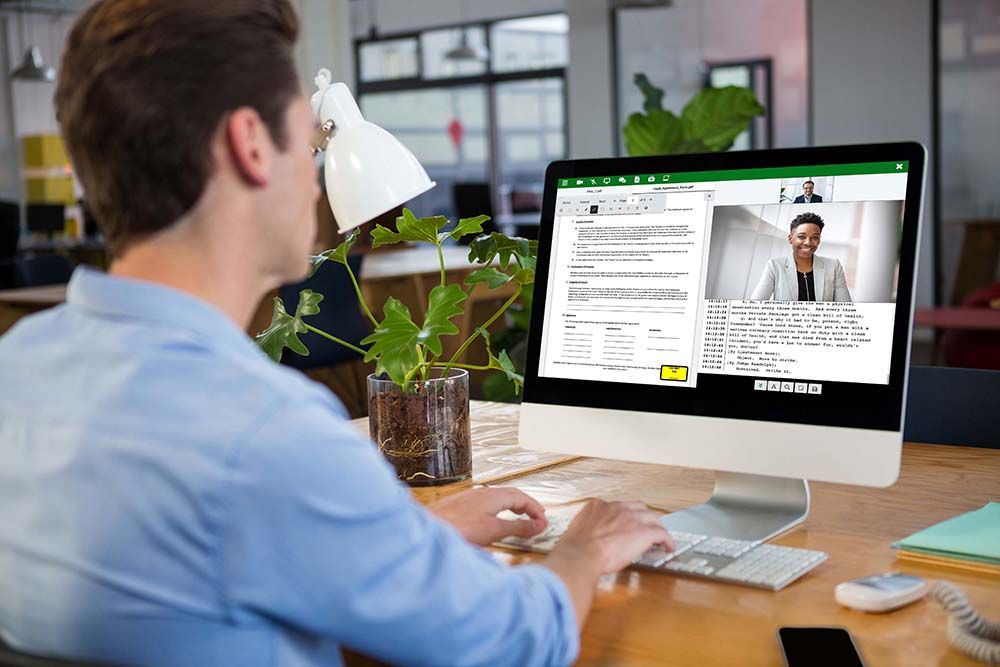Unlocking the Perks of Remote Depositions: A Comprehensive Guide for Modern Legal Practices
In the ever-evolving landscape of modern-day legal methods, the shift towards remote depositions has actually ended up being progressively prevalent. As the legal industry adapts to the digital age, recognizing how remote depositions can change the way depositions are conducted is critical for staying in advance in an affordable market.
Benefits of Remote Depositions

Moreover, remote depositions offer a cost-efficient remedy for legal proceedings. Without the need for traveling, expenditures such as transport, holiday accommodation, and place leasings are considerably lowered. This not just benefits law office and their customers monetarily but additionally adds to a more sustainable approach by lowering carbon emissions related to traveling.
In addition to the useful benefits, remote depositions also advertise inclusivity. By leveraging technology for online conferences, individuals who might have difficulty taking a trip to a physical place, such as those with disabilities or individuals in remote areas, can take part much more quickly in the legal process (REMOTE DEPOSITIONS). Generally, the advantages of remote depositions make them a useful tool for modern-day lawful methods seeking performance, price financial savings, and inclusivity
Performance and Time Savings

One major time-saving aspect of remote depositions is the elimination of travel time. Rather than commuting to a physical place, lawyers and witnesses can take part in the deposition from the comfort of their very own offices or homes. REMOTE DEPOSITIONS. This not only minimizes the moment invested in logistics yet also enables even more adaptable scheduling, as participants can stay clear of the constraints of traveling setups
Furthermore, remote depositions often simplify the process through attributes like real-time transcription and exhibit sharing, enabling all involved events to access details instantaneously. This immediate access to essential information advertises quicker decision-making and improves the general performance of the legal process.
Cost-Effectiveness and Access
Using remote here are the findings deposition technology can result in considerable price financial savings and boosted ease of access in lawful proceedings. By performing depositions from another location, lawful practices can eliminate various expenses connected with traditional in-person depositions, such as travel costs, lodging, and location rental fees. This cost-effectiveness is specifically helpful for regulation companies looking to streamline their operations and reduce overhead costs.
Furthermore, remote depositions enhance ease of access by allowing individuals to sign up with from various areas without the requirement for physical visibility in a details setup. This ease of access is specifically valuable for events or witnesses who may have trouble taking a trip because of wellness factors, geographical restrictions, or various other commitments. In addition, remote depositions make it possible for lawful professionals to get in touch with professionals or witnesses from worldwide, promoting a more varied and comprehensive technique to gathering proof and testament.
Versatility in Legal Practices
The change towards remote depositions not just brings about cost-effectiveness and ease of access benefits however also presents a brand-new level of adaptability in lawful methods. By leveraging remote deposition modern Extra resources technology, lawyers can set up and perform depositions extra efficiently, fitting the hectic timetables of all parties entailed. Furthermore, the versatility supplied by remote depositions advertises work-life equilibrium for legal professionals, enabling them to participate in depositions while attending to individual or various other professional obligations.
Approaches for Effective Remote Depositions
For effective remote depositions, precise prep work and clear communication are vital. Before the deposition, it is essential to make sure that all essential innovation is established and evaluated, including video conferencing software program, microphones, and cams. Lawyers should also acquaint themselves with the platform being utilized and go to these guys give clear instructions to all events included. Additionally, setting up a pre-deposition meeting to address any kind of technical problems and develop guidelines for the deposition can help simplify the procedure.

After the deposition, without delay evaluating the transcript and attending to any kind of inconsistencies or problems that occurred during the process is essential to ensuring an accurate document. By executing these strategies, lawful practices can perform effective remote depositions while maintaining specialist criteria.
Verdict
Finally, remote depositions provide many benefits for modern-day lawful practices. The effectiveness, cost-effectiveness, and versatility they provide make them a useful tool for conserving time and resources. By carrying out methods for efficient remote depositions, lawful professionals can streamline their processes and improve access for all parties included. Embracing remote deposition innovation can considerably benefit legal methods in the electronic age.